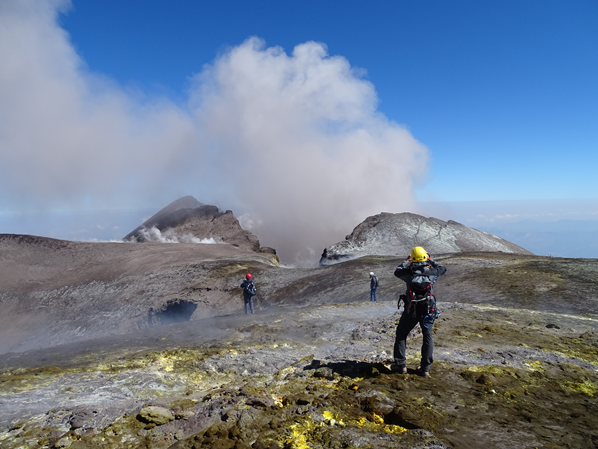L‘Osservatorio Etneo dell‘INGV organizzerà il secondo meeting annuale di EUROVOLC, il progetto europeo volto a favorire la collaborazione tra le realtà scientifiche che si occupano di vulcanologia per costituire una comunità vulcanologica integrata nel continente
Si svolgerà a Catania dal 27 al 31 gennaio il secondo meeting annuale del progetto europeo EUROVOLC (European Network of Observatories and Research Infrastructures for Volcanology) organizzato dall‘Osservatorio Etneo dell‘Istituto Nazionale di Geofisica e Vulcanologia (OE-INGV) e a cui partecipano ricercatori delle Sezioni di Napoli, Palermo, Pisa, Bologna e Roma dell’Istituto.
Il progetto, coordinato dall‘IMO (Islandic Metereological Office) ha avuto inizio nel febbraio 2018 e avrà durata triennale. Oltre all‘INGV fanno parte del consorzio altri sedici partner tra Enti di ricerca, Università, Agenzie di Protezione Civile e Piccole-Medie Imprese, appartenenti a nove nazioni europee (Francia, Grecia, Irlanda, Islanda, Italia, Portogallo, Regno Unito, Spagna e Svizzera).
Obiettivo di EUROVOLC, costituire una comunità vulcanologica europea attraverso l’integrazione, l‘armonizzazione e la collaborazione di tutte le realtà scientifiche che si occupano di vulcanologia nel continente. Lo strumento operativo è l’utilizzo di infrastrutture di ricerca nazionali e pan-europee e le infrastrutture associate ai supersite vulcanici europei (Etna, Vesuvio, Campi Flegrei e vulcani islandesi) nelle tre attività portanti del progetto: Networking, Ricerca Congiunta e Accesso Fisico e Virtuale a diverse infrastrutture e banche dati.
Nell’arco dei cinque giorni di incontro, la comunità di EUROVOLC discuterà il lavoro svolto nel 2019, dettaglierà le attività da svolgere nell’ultimo anno di progetto e concluderà i lavori con un’escursione sul fianco orientale dell’Etna per visitare le principali strutture vulcaniche e tettoniche, tra cui la faglia che ha generato il terremoto del 26 dicembre 2018 di Mw 4.9.
Nel corso del 2019, in particolare, EUROVOLC ha svolto numerose attività nell’area etnea e in Sicilia: tra queste, le visite ai laboratori geochimici della Sezione di Palermo dell‘INGV e la Summer School organizzata dall’Istituto dal 2 al 6 settembre a Linguaglossa, sul fianco nord-orientale dell’Etna, cui hanno partecipato 30 tra studenti e giovani ricercatori provenienti da tutto il mondo.
Particolarmente attesi dai partner che parteciperanno al meeting saranno poi i risultati relativi agli accessi fisici svolti nelle infrastrutture europee nel corso dell‘ultimo anno, tra cui gli esperimenti condotti sull’Etna, presso l’Osservatorio Vulcanologico di Pizzi Deneri dell’INGV, con una tecnica innovativa basata sull’uso delle fibre ottiche per il rilevamento dei segnali sismici.
Link al sito di EUROVOLC:
EUROVOLC, INGV organises the 2nd annual meeting of the EU project
Between 27 and 31 January 2020, INGV – Osservatorio Etneo organises the 2nd Annual Meeting of the EUROVOLC (European Network of Observatories and Research Infrastructures for Volcanology; ) EU project. The project is coordinated by IMO (Islandic Metereological Office), lasts three years and has started in February 2018. The Consortium includes 17 partners among which Research Institutions, Universities, Civil Protection Agencies, and SMEs, belonging to 9 European countries (Island, Italy, France, Spain, Portugal, Greece, Ireland, United Kingdom, and Switzerland). The project objective is the building up of a European volcano community through the integration, harmonisation and collaboration of all the European scientific realities dealing with volcanology. The effective mean is the use of the national and pan-European research infrastructures and the infrastructures related to the European volcano ‘Supersites’ (Mt. Etna, Vesuvius, Campi Flegrei, and the Islandic Volcanoes) in the three activity pillars of the project i.e. Networking, Joint Research, and Physical and Virtual Access to different infrastructures and data banks.
Throughout the five days of meeting, the EUROVOLC community will discuss what done in 2019, detail the activities to be carried out in the last year of the project, and will conclude with a fieldtrip on the eastern flank of Mt. Etna. The fieldtrip aims at visiting the main volcanic and tectonic structures, among which the fault that generated the 26 December 2018 earthquake. Amongst the project results achieved in 2019, those related to the physical access to the European infrastructures, in particular the experiments carried out at Mt. Etna (INGV Pizzi Deneri Observatory) with the novel technique based on the optical fibres for the detection of seismic signals, are chiefly expected.
Overall in 2019, the project has carried out other activities in the Etnean territory and in Sicily, such as the physical access to the INGV - Palermo geochemical laboratories and the Summer School organised by INGV from 2 to 6 September 2019 in Linguaglossa (the North-East flank of Mt. Etna), to which 30 people among students and young researchers worldwide participated.
Roma, 23 gennaio 2020


Foto – Area sommitale dell'Etna. Attività di degassamento al Cratere di Nord Est ripresa durante le attività di monitoraggio dell'OE-INGV (21 agosto 2019) © Giuseppe Puglisi
#ingv #eurovolc #osservatorioetneo #vulcani #europa #imo




